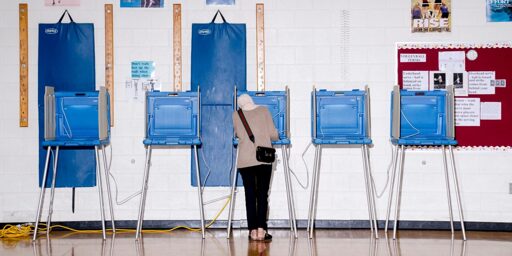CrimeDad
Father; husband; mechanical engineer. Posting from my self-hosted Lemmy instance here in beautiful New Jersey. I also post from my Pixelfed instance.
- 345 Posts
- 1.03K Comments

 2·1 day ago
2·1 day agoMy very own.
 21·3 days ago
21·3 days agoDon’t forget that this lady really got on the stage at the convention and shouted the lie that the Biden-Harris administration have been working tirelessly for a ceasefire in Gaza.
 1·5 days ago
1·5 days agoThey did really badly this time, repeating mistakes from previous campaigns. I’m not saying they can’t fix their problems, but it will be clear that they haven’t if the same people are running the next campaign and they keep trying to court Republicans.
 21·5 days ago
21·5 days agoRight, but the premise of the question is that the Democrats are no longer viable at the Presidential level either.
 51·6 days ago
51·6 days agoI am personally not a fan of the Green Party, but as a point of fact they are more than just Jill Stein. My ballot had Green Party candidates running in three races.
 42·6 days ago
42·6 days agoOkay, but the party permitted Biden to campaign for reelection and then decided to run Kamala without a real primary.
 4·6 days ago
4·6 days agoI tend to agree, but the people I’m asking aren’t ready to consider anything but electoralism.

 12·7 days ago
12·7 days agoPlease relax. I don’t claim to have special moral purity or whatever. Opposing genocide just seems like an obvious baseline. Besides, from the perspective of the individual voter (or eligible non-voter) there were no options of statistical possibility. The election was going to go the way it did regardless of what you or I decided to do with our single ballots. The voters who compromised on genocide got nothing except self-imposed damage to their minds and souls. The only way it would have gone differently is if the Democrats ran a better campaign with a different platform and probably with a different candidate.
 7·8 days ago
7·8 days agoBake some cookies. Apart from that, maybe find some colorful wall art and rugs. How about painting the wall behind the sink a fun, warm color to break up all the white?
I like your kitchen very much, btw.

 23·8 days ago
23·8 days agoI’m not saying that in the US system, at the presidential level, the loss of one of the two main parties doesn’t ensure the victory of the other. I’m saying that that doesn’t matter to a regular individual who is eligible to vote. That person only gets one ballot and their choices are what is printed on the ballot as well as leaving some or all of it blank.
This one or the other correlative is actually the purview of the campaigns. They have the power to sway enough votes to matter by adjusting their messaging, strategy, and, for the incumbents, actual policy. Instead of looking at what they were up against and eschewing the status quo, the Democrats decided to make the following threat to voters: give us permission to keep exterminating Palestinians or the other guy might take away your various rights here at home. The continued massacre of Palestinians wasn’t their only demand, but I’m just trying to stay on-topic. It’s darkly humorous that the voters who made the choice to acquiesce to that threat ended up morally compromising on genocide for a candidate that apparently was going to lose anyway.

 23·8 days ago
23·8 days ago“I voted for the genocide lady in the hopes of rewarding her and her party with four more years in the White House and blocking anyone who hasn’t had a material role in the Palestinian genocide .” That’s what you sound like. You cannot morally justify voting for Harris unless you can justify her ongoing role in the genocide. No one else running for president came close to playing such a role and, of course, there’s nothing immoral about abstaining.
Anyway, I’m just answering the OP. One does not have to vote on the basis of morality. People make immoral decisions all the time. It’s just easily understandable why many people wouldn’t cross that line.

 33·8 days ago
33·8 days agoTo an individual voter in a large electorate the idea that a Harris loss would ensure a Trump victory isn’t relevant except as an excuse to vote immorally for Harris, the genocide candidate. The only moral choices were to abstain or vote for an explicitly anti-genocide candidate.

 76·8 days ago
76·8 days agoThe moral argument against voting for Harris doesn’t imply that one has to vote for Trump instead.

 87·8 days ago
87·8 days agoThe moral argument that one should not vote for someone who has been and continues to provide massive material support to a genocide is as clear as day.
 712·9 days ago
712·9 days agoAh, well! Nevertheless,
 1·10 days ago
1·10 days agoI have to figure out the math on it, but I doubt that 2:1 is a good deal.
Follow-up edit:
- In New Jersey, as an example of a safe state for Harris, Fivethirtyeight has Harris winning in 993 out of 1000 simulated elections. Assuming the same turnout as 2020 of 4,549,457 votes, there’s a 0.500546 chance, on average, that a NJ voter will vote for Harris. I figured that out using the BINOM.DIST.RANGE function and the Goal Seek tool in Excel.
- In Michigan, with a turnout of 5,539,302 voters in 2020, Harris wins in only 605 out of 1000 simulations. Using the same tools above, if you randomly picked any Michigan voter, there’s a 0.500059 chance that he or she is voting for Harris.
- Using the BINOMDIST function with the assumed turnouts and the chances we determined that voters in each of the above states would go for Harris, there’s a 3.25986e-4 chance that Michigan is decided by a single vote. Likewise, there’s a 2.47681e-5 chance for the same in NJ. Based on the probability that it could shift electoral college votes, a Michigan ballot is distinctly more powerful than an NJ one.
- If you could could reliably convince one more person to vote like you in NJ, your chances of affecting the NJ outcome only increase to 2.48222e-5.
- For an NJ voter to match their chances of affecting the Michigan outcome, they would have to command about 1,925 votes besides their own. In other words, there’s an almost equal chance of a single vote Harris victory in MI as a 1,926 vote victory in NJ.
- Therefore, if a Michigan voter values their power, they should not trade their vote for anything less than 1,926 New Jersey votes. The rate should actually be greater to account for welching and Michigan having one more electoral vote than NJ.

 8·10 days ago
8·10 days agoIt mostly makes sense. There are infamous examples of voting being de jure or de facto illegal for groups of people where their suffrage would likely cause significant change. Just look at the USA pre-Civil Rights Act, Rhodesia, Apartheid South Africa, and Israel. I’m sure there are others.

 1·11 days ago
1·11 days agoYou assume that dolphins don’t already have democracy. If wild dogs have it figured out, then it’s certainly possible, even likely, that dolphins do too. Imagine what a pod of dolphins might vote to do with a land mammal that has the audacity to try and teach them democracy.











I did and the one feature she mentioned was that the tiles should be like stones. I guess me figuring it out is part of the gift.